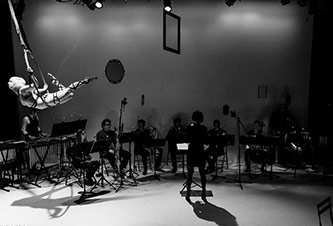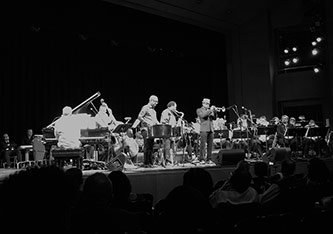American Music Review
Vol. XLV, No. 2, Spring 2016
By Jeffrey Taylor, Brooklyn College
Congratulations to our Graduate Fellow Whitney George, who recently conducted her ensemble The Curiosity Cabinet in the performances of two works. The first, on 23 May at Dixon Place in Manhattan, featured Night: Like Velvet, in Twelve Letters, in which George set texts by Sylvia Plathe and Ted Hughes in a non-linear song cycle that evoked the sometimes strained relationship between the two poets. Beautifully sung by soprano Sharon Harms, the twelve movements (each composed during a different month of the year) featured a male actor, aerialist, and dancer, all accompanied by the rich contrapuntal textures of the nine-piece ensemble. Then on 10 and 11 June, at the DiMenna Center, The Curiosity Cabinet was featured again in a staging of George’s one-act opera The Yellow Wallpaper, based on an 1892 story by Charlotte Perkins Gilman. Gilman’s story follows the descent of Victoria (the central character) into insanity after her husband confines her in a room lined with paper that made her “think of all the yellow things I ever saw—not beautiful ones like butter cups but old, foul, bad yellow things.” First performed in 2010, George had extensively revised the piece, adding a role for baritone. Though performed with a minimum of costumes, sets, and lighting effects, the work vividly portrays how the main character’s unease blossoms into terror as she begins to see figures behind the wallpaper. But far from the hysterical woman of stereotype, Victoria emerges from her ordeal free and defiant. Judging from the enthusiastic responses by capacity crowds at both events, these two works deserve a long performance life. Brava!
On 8 February the Institute hosted a talk by renowned Cuban composer and conductor Guido López-Gavilán, who is President of the Havana Festival and Chairman of the Orchestral Conducting Department at the Instituto Superior de Arte. We hope that this event with Maestro López-Gavilán made the first of many new connections between Cuba and the Hitchcock Institute, as trade and travel restrictions begin to loosen. On 21 March, Senior Research Associate Ray Allen shared research for his upcoming book in “Jump Up! The Brooklyn Soca Connection,” and on 4 May Michael Weinstein-Reiman gave some new insights into the contemporary pop scene with “Going Postal: Posthumanism, Queerness, and Nicki Minaj’s ‘Monsters.’” Finally, in what is becoming an annual “global jazz” event, the Institute partnered with The Central Brooklyn Jazz Consortium in “An Evening of Calypso Jazz” on 21 April, featuring trumpeter Etienne Charles, composer and pianist Frankie McIntosh, steel pan artist Garvin Blake and bassist David “Happy” Williams as well as Arturo O’Farrill and the Brooklyn College Big Band.
In January Institute Director Jeffrey Taylor was interviewed by Special Advisor Randall Horton for an episode of the American Music TV series now being produced at Brooklyn College. As mentioned in our last issue, the Institute hopes to become much more involved in the ongoing creation of these programs. The episode, in which Taylor talks about the scholarly study of American music and the history and mission of HISAM, will be posted on our website. Research Associate Stephanie Jensen-Moulton started off a busy spring of lectures at the annual meeting of the Society for American Music, where she participated in a panel of speakers on diversity and inclusion. She also presented on Disability and Music at Clark University, and gave keynote lectures at both Rutgers University and Lehman College on disability in John Adams’ opera The Death of Klinghoffer. Ray Allen continues his research on Brooklyn Carnival music. This spring he delivered two presentations on the topic: “Who is Globalizing Whom? Brooklyn Soca Music and Transnational Musical Practice” at the Society for American Music annual conference in Boston, and “Steel and Brass in Brooklyn: Carnival Music, Globalization, and Transnational Identity,” at the CUNY Graduate Center’s Musics, Immigrants and the City conference. And amidst a busy performing schedule, Research Associate Arturo O’Farrill led a premiere of his “Cornel West Concerto” at Harlem’s Apollo Theater on 21 May. Writer, teacher and activist West provided inspiration for the work, which was commissioned by the Apollo. West himself performed an oration in four sections, with each punctuated by instrumental solos. The text addressed questions posed by W.E.B. Du Bois in The Souls of Black Folk about integrity, honesty, decency and virtue.








